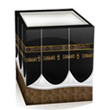Prayer with Urinary Incontinence
- Details
- Category: Sheikh Otheimin
- Published on Tuesday, 12 November 2013 12:26
- Hits: 928
Prayer with Urinary Incontinence
Question:
A person is inflicted with urinary incontinence, so is it permissible for him to perform some acts of worship such as prayer, recitation of Qur'aan, and tawaaf with one wudu?
Answer:
That which is well known with the people of knowledge is that a person who is inflicted with urinary incontinence makes wudu for prayer after its time has entered, and when he makes wudu after the time of prayer has entered then he remains upon purity until the time ends.
So when the time enters and he wishes to perform an act of worship for which tahaarah is required, then he must purify himself again. Based upon that, if he makes wudu for the Maghrib prayer after the adhaan of Maghrib and then the time of Ishaa comes, then he must leave (the masjid) and make wudu again. This is in case he passes some urine. As for when nothing comes out from him during this time period then there is no need to repeat the wudu. So if it was the case that he made wudu for Fajr prayer after the adhaan of Fajr and remained in tahaarah until the sun has risen, then there is no need to repeat the wudu.
Shaykh Muhammad bin Saalih al-`Uthaymeen
Selected Faatwaa on Salaah
Translated by Abul Irbaad Abid Zargar





















